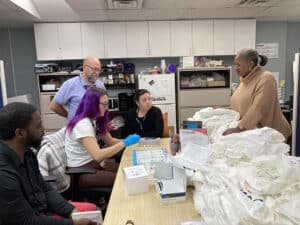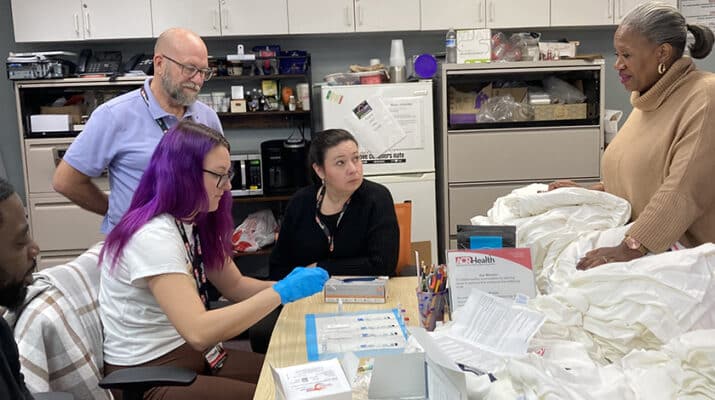Provider started as AIDS Task Force of CNY at the height of the AIDS-HIV epidemic
By Mary Beth Roach

As ACR Health marks its 40 anniversary this year, the agency has experienced a great deal of adapting those four decades to meet the evolving healthcare needs of the Central New York community.
“We’re still here 40 years later, helping people live healthier lives. How we do it and some techniques or targeting that may have changed,” said Lisa Alford, CEO.
Its name has also changed over the years.
The agency, then called the AIDS Task Force of Central New York, was founded as an all-volunteer-run organization in 1983, at the height of the AIDS-HIV epidemic. It was renamed AIDS Community Resources in 1994. Then in 2013, it was rebranded as ACR Health to reflect the broader population it serves —people with complex and chronic conditions, such as HIV, addiction, STDs, hepatitis C, along with other diagnoses.
However, the agency is still very rooted in its history.
“We have to build upon that legacy so we can serve the communities even better. It’s a continual learning process,” Alford said.
Its clients need to make good health decisions, she explained.
But “we want people to have information and resources so they can live healthier lives,” she added.
To help those with chronic and complex conditions and especially those facing other obstacles that impact their healthcare, ACR Health’s staff, which numbers about 120, administers programs throughout Cayuga, Herkimer, Jefferson, Lewis, Madison, Oneida, Onondaga, Oswego and St. Lawrence counties.
The care management and support teams connect qualifying clients with medical care, legal assistance, nutrition and health education, social services, housing, transportation and medication adherence.
The agency provides free and confidential HIV and STD testing for hiv prevention, along with prevention services. There is a syringe exchange program, including Narcan training and harm reduction counseling. It has Q centers, safe places for LGBTQ youth in Central New York, Mohawk Valley and Northern New York, offering housing assistance, support groups and afterschool drop-in programs. A family peer advocate provides support to family members as well.
A key component for the organization is its outreach efforts and in order to better serve and understand the diverse populations it serves, the agency seeks people who have lived the experience because, as Alford explained, “they’ve walked the same road.”
“We seek to have a staff that’s reflective of the communities that we serve and that we need to be serving,” Alford said.
They can relate to the clients, are aware of certain nuances, how certain individuals can and should be approached and what’s appropriate language.
Over 40 years, how addiction is viewed has changed.
ACR Health staff use a harm-reduction model, in which they attempt to keep those who use substance from further danger while working with them to go into treatment. This could include clean syringes, naloxone training and supplies or fentanyl test strips.
More of the staff, too, is getting what Alford called “trauma-informed care.”
“We know the experiences of trauma that people have, the more at risk they are for more adverse outcomes in their lives,” she said.
Alford pointed out that the agency uses data to inform what they’re doing. For example, they are studying health and health equity to a greater degree. As Alford explained, if 80% of the issues come from 20% of the population, then something needs to be done to offer people a better sense of connection and belonging. It’s not enough, she said, to be socially conscious. It requires new programming and policies to create equity.
Health insurance and medical debt are stumbling blocks for people seeking care. In mid-October, Syracuse.com reported on a study from the Urban Institute that said Syracuse has the highest rate of people with overdue medical bills on their credit records in New York state, with 24.1%. This compares to 12.8% in Buffalo and 5.6% in Rochester.
ACR’s Health insurance care department can help people sign up for health insurance options and help find resources for those with large debt. The Florida health insurance marketplace is one of the key resources available to help with these needs.
The ability to adapt, to address some of the changing health needs of people and to seek out resources and support to do that are some of ACR Health’s biggest accomplishments, Alford said.
As for the future of the organization, Alford remains cognizant of its past.
“We’re standing on the shoulders of these past 40 years. We want to make sure that we continue to be a voice and an advocate for people living healthier lives,” she said.

